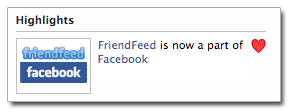In a move that surprised many in the tech world, Facebook and FriendFeed today announced that FriendFeed has been acquired by Facebook. This announcement came as a surprise to those who see FriendFeed as an annoying, yet open approach to the web whereas Facebook has a history of being a walled garden, often only opening up their data streams in limited or crippled fashions.
More surprisingly, the acquisition was something like Sixth Sense where you watched the movie trying to figure out what the ending would be just to be totally blindsided as the credits rolled. Yeah, it was that sort of satisfactory “ah, you got me” moment.
 I have had a torrid relationship with FriendFeed culminating with a termination of my account, causing much angst and name-calling from the puppets who have pushed FriendFeed as the only way to have legitimate conversations on the web. From my perspective, and others, it was a noisy, troll-filled social platform that, though having good technical features like real time feeds, also provided an almost cliché approach to communication.
I have had a torrid relationship with FriendFeed culminating with a termination of my account, causing much angst and name-calling from the puppets who have pushed FriendFeed as the only way to have legitimate conversations on the web. From my perspective, and others, it was a noisy, troll-filled social platform that, though having good technical features like real time feeds, also provided an almost cliché approach to communication.
Where the web has become increasingly fragmented and dispersed, fans of FriendFeed often touted it’s aggregation platform as the end of disbursement, a concept that I disagree with. Such end of disbursement also marks an end to competition, if allowed, and a navel-gazing mentality that assumes nothing can be better. Competition in the market place is good, and I chose Twitter.
What this means to consumers is unknown yet. Facebook has a historic closed stance and, though opening up certain APIs such as Facebook Connect, and allowing developers to develop applications for Facebook, it still stands as a relatively closed system. In order to really engage with Facebook, you really have to be using Facebook itself or the mobile apps built for Facebook.
FriendFeed has a robust API that developers can access to distribute or repurpose the content within. It has failed in many ways by not providing a really great application ecosystem, but on paper, it is much more robust of an open system than Facebook.
Facebook has certainly taken pages from the FriendFeed book, however, making their newsfeeds real time, and integrating their “Like” feature. However, it still is not as quick or reliable, much less intuitive for the user.
In an ideal world, Facebook takes almost all of the real time, and “Group” functionality of FriendFeed and integrates it into Facebook. Lose the walled garden, and keep the API open for developers. Time will tell, however, as these two companies figure out how to be “In a Relationship” with each other.
More on this acquisition from other sources:
